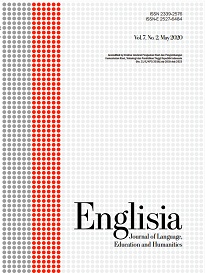Understanding identity construction of an in-service pre-k teacher using discursive psychology
DOI:
https://doi.org/10.22373/ej.v10i2.13998Keywords:
Discursive Psychology, The Identities Building Tool, Teacher Identity ConstructionsAbstract
Experts have asserted that teacher identity is an integral part of classroom practices; studying teacher identity construction would allow us to understand the teachers’ learning process and teaching practices. It is then argued that identity is fluid and is never a stand-alone aspect. Further, many studies of the discursive construction of teacher identities have suggested teacher identity construction is highly contextual. However, little research has focused on how pre-K teachers serving low-income students and families construct their professional identities discursively. Grounded within the perspectives of Discursive Psychology, this study is interested in how a US government-sponsored pre-K program teacher discursively constructs her identities. The findings further suggest the fluidity of identity and particularly posit that the teacher has constructed and claimed her collective and co-constructed identities, as well as discursively formed her identities as a person who values social capital, who is practical, who serves the needy students and families, who has power or resources, and who is a lifelong learner. The findings further implicate the need to consider teachers’ identities to understand their learning, growth, and classroom practices.
Downloads
References
Alsup, J. (2006). Teacher identity discourses: Negotiating personal and professional spaces. Routledge.
Atkinson, D. (2004). Theorising how student teachers form their identities in initial teacher education. British Educational Research Journal, 30(3), 379-394. https://doi.org/10.1080/01411920410001689698
Bathmaker, A.-M., & Avis, J. (2013). Inbound, outbound, or peripheral: the impact of discourse of ‘organisational’ professionalism on becoming a teacher in English further education. Discourse: Studies in the Cultural Politics of Education, 34(5), 731-748. https://doi.org/10.1080/01596306.2013.728367
Cirocki, A., & Farrell, T. S. (2019). Professional development of secondary school EFL teachers: Voices from Indonesia. System, 85, 102111. https://doi.org/10.1016/j.system.2019.102111
Devos, A. (2010). New teachers, mentoring, and the discursive formation of professional identity. Teaching and Teacher Education, 26, 1219-1223. https://doi.org/10.1016/j.tate.2010.03.001
Fairclough, N. (2001). Language and Power (Language in Social Life) (2nd ed.). Routledge.
Gee, J. P. (2014). How to do discourse analysis: A toolkit. Routledge.
Gee, J. P. (2015). Discourse, Small d, Big D. The International Encyclopedia of Language and Social Interaction, 1–5. https://doi.org/10.1002/9781118611463.wbielsi016
Higginbotham, D. J., & Engelke, C. R. (2013). A Primer for Doing Talk-in-interaction Research in Augmentative and Alternative Communication. Augmentative and Alternative Communication, 29(1), 3–19. https://doi.org/10.3109/07434618.2013.767556
Jorgensen, M. W., & Phillips, L. J. (2002). Discourse analysis as theory and method. SAGE.
Li, L. (2020). Novice Teachers’ Discursive Construction of Their Identity: Insights from Foreign Language Classrooms. Iranian Journal of Language Teaching Research, 8(3), 57–76. https://doi.org/10.30466/IJLTR.2020.120934
Potter, J., & Wetherell, M. (1987). Discourse and social psychology. SAGE.
Richardson, S., & Maggioli, G. D. (2018). Effective professional development: Principles and best practice. Cambridge University Press. https://www.cambridge.org/elt/blog/wp-content/uploads/2018/04/Whitepaper_TD_72dpi-FINAL-ONLINE-VERSION.pdf
Ruohotie-Lyhty, M., Aragão, R. C., & Pitkänen-Huhta, A. (2021). Language teacher identities as socio-politically situated construction: Finnish and Brazilian student teachers’ visualizations of their professional futures. Teaching and Teacher Education, 100, 103270. https://doi.org/10.1016/j.tate.2020.103270
Saldana, J. (2015). The Coding Manual for Qualitative Researchers (3rd ed.). SAGE Publications Ltd.
Tan, M. Y. (2020). Discourses and Discursive Identities of Teachers Working as University-Based Teacher Educators in Singapore. Journal of Teacher Education, 72(1), 100–112. https://doi.org/10.1177/0022487119896777
Tsui, A. B. M. (2007). Complexities of identity formation: A narrative inquiry of an
EFL teacher. TESOL Quarterly, 41(4), 657-680. https://doi.org/10.1002/j.1545-7249.2007.tb00098.x
Trent, J. (2010). From rigid dichotomy to measured contingency. Hong Kong preservice teachers’ discursive construction of identity. Teaching and Teacher Education, 26, 906-913. https://doi.org/10.1016/j.tate.2009.10.031
Trent, J., & Lim, J. (2010). Teacher identity construction in school-university partnerships: Discourse and practice. Teaching and Teacher Education, 26, 1609-1618. https://doi.org/10.1016/j.tate.2010.06.012
Wang, F., Guo, J., Wu, B., & Lin, Z. (2021). “It Is Utterly Out of My Expectation”-A Case Inquiry of Teacher Identity of an EFL Teacher in a Chinese Shadow School Setting. Frontiers in Psychology, 12. https://doi.org/10.3389/fpsyg.2021.760161
Zacharias, N.T. (2010). The teacher identity construction of 12 Asian NNES teachers in TESOL graduate programs. The Journal of Asia TEFL, 7 (2), 177-197
Zakaria, F. (2021). A single case study of an online Indonesian English teacher educators' professional development community (28650620) [dissertation, Indiana University Bloomington]. ProQuest Dissertations Publishing
Downloads
Published
Issue
Section
License
Proposed Policy for Journals That Offer Open Access
Authors who publish with Englisia journal agree to the following terms:
- Authors retain copyright and grant the journal right of first publication with the work simultaneously licensed under a Creative Commons Attribution License that allows others to share the work with an acknowledgement of the work's authorship and initial publication in this journal.
- Authors are able to enter into separate, additional contractual arrangements for the non-exclusive distribution of the journal's published version of the work (e.g., post it to an institutional repository or publish it in a book), with an acknowledgement of its initial publication in this journal.
- Authors are permitted and encouraged to post their work online (e.g., in institutional repositories or on their website) prior to and during the submission process, as it can lead to productive exchanges, as well as earlier and greater citation of published work (See The Effect of Open Access).









